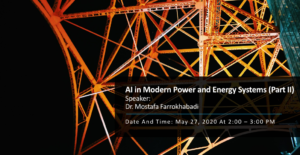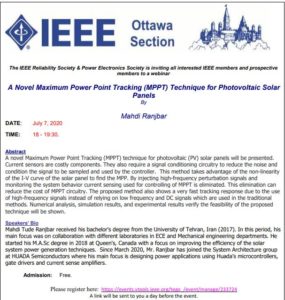Events
IEEE Ottawa Seminar Series on AI and Machine Learning
IEEE Ottawa Section, PHO
Chapter, CS Chapter, SP Chapter, TEMS Chapter
Jointly with Vitesse
Reskilling
The Rise & Foreseeable Future of
Artificial Intelligence:
Observations from a Commercial Pioneer
Peter MacKinnon
Synergy Technology
Management
—————————————————————-
Wednesday, April 22, 2020
359 Terry Fox Drive, Suite 200, Kanata, Ontario
11:30 – 13:30
—————————————————————-
 Artificial Intelligence (AI) is constantly in the news
Artificial Intelligence (AI) is constantly in the news
with stories of promise and peril.
Political leaders have declared it a national priority, the global high
tech industry is racing AI apps to markets and policy and governance
implications of AI are in their infancy.
We will explore where this is all heading.
We will begin with some definitions and a bit of
history behind the rise of AI. The talk
will then place AI in the context of being a potentially disruptive technology
on society. This will lead to a discussion about ethics and moral issues
regarding the development and use of aspects of AI as a dual-use
technology. Time permitting, the role of
AI in defence and security will be used as an example for appreciating the
complexity and ethical issues brought on by AI. We will then turn to the role
of the engineer in this new world being enabled by AI.
Finally, we will review potential governance and
policy issues and options to address the rapid unchecked development and
application of AI within society at large; and, ultimately end with a
precautionary note.
Â
Biography
The speaker was
a pioneer in the commercialization of AI in the 1980s and today is actively
involved in ethical and policy issues related to AI. Peter has an extensive background on the
forefront of scientific and technological breakthroughs around disruptive
technologies and their impacts on society.
He was an early proponent in the development and promotion of Big Data
and data analytics using High Performance Computers, and was a major
contributor in creating the Internet in Canada, among other accomplishments.
Peter has a
background as a scientist, business manager, entrepreneur, domestic and
international bureaucrat, executive, diplomat, management advisor, and academic;
including most recently affiliation with both Telfer School of Management and
the Faculty of Engineering at the University of Ottawa and the Faculty of
Engineering at Carleton University. Peter
also blogs on AI for the Institute on Science, Society and Policy, an
interfaculty organisation at uOttawa.
Â
—————————————————————-
Event
is free, but space is limited. All
participants must register in advance. Â
Please
follow the link to register
https://events.vtools.ieee.org/m/226058
—————————————————————-
For
more information, please contact: Kexing Liu kexing.liu@ieee.org
IEEE Ottawa Seminar Series on AI and Machine Learning
IEEE Ottawa Section, PHO
Chapter, CS Chapter, SP Chapter, TEMS Chapter
Jointly with Vitesse
Reskilling
The Rise & Foreseeable Future of
Artificial Intelligence:
Observations from a Commercial Pioneer
Peter MacKinnon
Synergy Technology
Management
—————————————————————-
Wednesday, April 22, 2020
On-line Webinar
112:00 non – 13:30
—————————————————————-
 Artificial Intelligence (AI) is constantly in the news
Artificial Intelligence (AI) is constantly in the news
with stories of promise and peril.
Political leaders have declared it a national priority, the global high
tech industry is racing AI apps to markets and policy and governance implications
of AI are in their infancy. We will
explore where this is all heading.
We will begin with some definitions and a bit of
history behind the rise of AI. The talk
will then place AI in the context of being a potentially disruptive technology
on society. This will lead to a discussion about ethics and moral issues
regarding the development and use of aspects of AI as a dual-use
technology. Time permitting, the role of
AI in defence and security will be used as an example for appreciating the complexity
and ethical issues brought on by AI. We will then turn to the role of the
engineer in this new world being enabled by AI.
Finally, we will review potential governance and
policy issues and options to address the rapid unchecked development and
application of AI within society at large; and, ultimately end with a
precautionary note.
Â
Biography
The speaker was
a pioneer in the commercialization of AI in the 1980s and today is actively
involved in ethical and policy issues related to AI. Peter has an extensive background on the
forefront of scientific and technological breakthroughs around disruptive
technologies and their impacts on society.
He was an early proponent in the development and promotion of Big Data
and data analytics using High Performance Computers, and was a major
contributor in creating the Internet in Canada, among other accomplishments.
Peter has a
background as a scientist, business manager, entrepreneur, domestic and
international bureaucrat, executive, diplomat, management advisor, and
academic; including most recently affiliation with both Telfer School of
Management and the Faculty of Engineering at the University of Ottawa and the
Faculty of Engineering at Carleton University.
Peter also blogs on AI for the Institute on Science, Society and Policy,
an interfaculty organisation at uOttawa.
Â
—————————————————————-
Event
is free, but space is limited. All
participants must register in advance. Â
Please
follow the link to register
https://events.vtools.ieee.org/m/226058
—————————————————————-
For more information,
please contact: Kexing Liu kexing.liu@ieee.org

This seminar discusses the use of AI in modern power and energy systems, in particular electrical distribution networks.
About this Event
Driven by global environmental emission issues and tighter
requirements for system resilience and reliability, electricity
production is shifting from a centralized paradigm to a decentralized
one. In this context, renewable energy sources (RES) and electric
vehicles (EVs) have proliferated over the past decade, exhibiting a
steadily increasing trend. Thus, today, a large number of wind turbines,
photovoltaic (PV) panels, and EVs are connected to medium- (1-69 kV)
and low-voltage (=1 kV) grids, with traditional integrated bulk power
systems becoming decentralized in the presence of active distribution
networks, where the flow of power is bidirectional between generators
and “prosumers”. Such systems are typified by a high penetration of
metering infrastructures, generating a large volume of data, providing
the opportunity to harness the power of big data using data-driven
techniques.
This seminar discusses the use of artificial
intelligence (AI) in modern power and energy systems, in particular
electrical distribution networks. Real-world examples of the use of AI
for energy storage systems optimization and control will be provided and
discussed.
Key Focus
- What are modern power systems control and optimization issues?
- How data-driven techniques can help?
- What is the state-of-the-art?
- What is the path forward?
Admission is FREE! Everyone is welcome! Registration is required!
BIOGRAPHY:
Dr.
Mostafa Farrokhabadi is the Senior Director of Technology at
BluWave-ai. Concurrently, he serves as Associate Editor of IEEE
Transactions on Smart Grid. He has more than 8 years of experience in
designing mission critical grid solutions for industry and academia,
including technical leadership of a $6M international consortium in
electric grid modernization, and smart grids projects with Hatch and
Canadian Solar. Mostafa has (co)authored several articles in high-impact
journals, conference proceedings, and magazines, and holds patents on
intelligent control and optimization of renewable-penetrated grids.
Mostafa has also led the award-winning IEEE Power and Energy Society
Task Force on microgrid stability, an international coalition of 21
researchers from 14 institutions investigating stability issues in
microgrids. Mostafa obtained his PhD in Electrical and Computer
Engineering from the University of Waterloo. He has also studied and
performed research in Sweden at KTH and Germany at KIT. During the
course of his career, Mostafa has received multiple business, research,
and teaching awards, including the prestigious University of Waterloo
Doctoral Thesis Completion Award and Ottawa’s Forty Under 40.

The virtual series of IEEE Women in Engineering International Leadership Conference (WIE ILC) 2020.
The IEEE WIE ILC Virtual Series will take place throughout June 2020,
offering 1-hour sessions, live panel discussions, virtual networking
opportunities, and an on-demand library for you to browse when it’s
convenient for you. Registration is free!
Visit http://ieee-wie-ilc.org/virtual2020/ for more information.
#IEEEWIE

|
The IEEE Reliability Society & Power Electronics  A Novel Maximum Power Point Tracking (MPPT) Technique for Photovoltaic Solar Panels By  Mahdi Ranjbar DATE:      July 7, 2020 TIME:       18 – 19:30.     A  Mahdi
A link will be sent to you a day before the event. Â |

